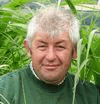Finishing cattle to specific weights is challenging

Heavy abattoir penalties for cattle and unsettling messages from the NFU’s annual general meeting have given Martin Howlett pause for thought. Olivia Cooper reports
The mild winter weather has seen finished cattle grow at an exceptional rate, and finishing them to the right specification on the processor’s slaughter grid to avoid overfat carcasses has proved a challenge for Martin Howlett.
“We’ve sold 10 Welsh Blacks and 30 Charolais cattle over the past six weeks, and have another 20 continental crosses to go over the next week,” says Mr Howlett.
Excellent maize silage and the mild winter weather have boosted cattle condition rapidly. “We’ve been picking them faster than ever before because they’re getting fat so quickly.
“It’s been a complete reverse to last autumn – the heifers have almost all hit 4L specification, but some have crept up to 4H and one to 5L.”
Abattoir penalties
Keeping cattle longer and missing the ideal grading specification is costing Mr Howlett 25-50p/kg in abattoir penalties, a disastrous £75-£150 a head. “Trying to get the weights right while watching the fat class is a real balancing act.”
Mr Howlett is still disappointed with the prices he receives, at 197p/kg for an R4L carcass plus a 5p/kg suckler bonus from Jaspers.
“That has remained flat since before Christmas, which suggests supply and demand is not playing its part in price any more. If we’re to break even, we need to be seeing higher prices to balance the relatively low values before the autumn. It just shows the abattoirs are controlling the whole market.”
The most recent batch of steers averaged £669 a head, with the heifers making £564 a head. “They were bought in autumn 2005 at about £385 and £280, respectively,” says Mr Howlett.
“That might sound like good money but it’s costing £70-£100 a head to overwinter them, which doesn’t leave a lot of gross margin, let alone net margin.”
Benefit
However, one benefit to this year’s quicker finishing is that it leaves more forage for the 120 TB-restricted Welsh Black and Belted Galloway stores, which are penned in a separate unit on the farm.
Mr Howlett plans to keep these cattle indoors until after what will hopefully be their second clear TB test in early May. “They are flighty animals and I don’t want to turn them out at Easter, just to bring them back in again in May. The feed that’s left will be needed for these stores, but it looks like we’ll see the winter through.”
Many of the ewes and lambs are also facing a late turnout this spring after three weeks of torrential rain.
“The ewe lambs have scanned at an average of 100%, which is pleasing. And we’ve sold 10 empty ewes at an average of £38.50 a head which is better than previous years.”
Concern
But he was not so pleased with some of the outcomes of last week’s NFU agm. “We heard from Helen Phillips, head of Natural England, and many of us have come away jittery.
“There was a lot of concern about her single-mindedness – she suggested that both the Entry Level Scheme and HLS should be more difficult to get into – and we all know that the hidden agenda is that there isn’t enough money to pay for them.”
Mr Howlett is also worried about David Miliband’s lack of action over bovine TB. “We were pleased to see that he spent some real time talking to farmers, but none of us came away with any confidence for a short-term announcement to tackle the disease.
“I remain fearful of the present big issues of continuing low prices and bovine TB. Neither is still being genuinely addressed.”
- More information on Deer Park Farm
- More information on other Management Matter farms
